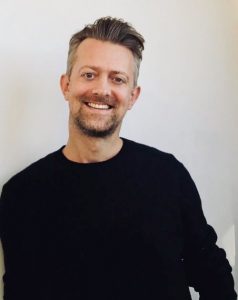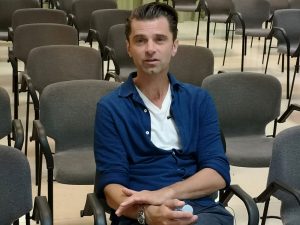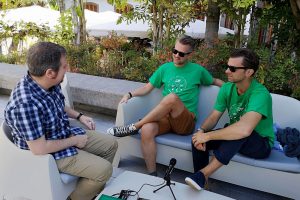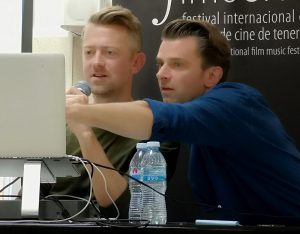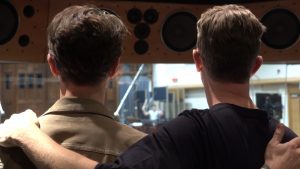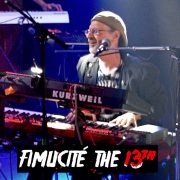Ben & Nick Foster – Interview
During the 12th edition of FIMUCITÉ festival, Gorka Oteiza had the opportunity to interview British composers and brothers Ben Foster & Nick Foster.
In the interview that follows, they talked about many things such as how having different initial backgrounds (record producer and composer & conductor) both ended composing for media, how is the collaboration between brothers in a project, the abilities a conductor needs to lead live film/TV music concerts, how was the experience in Doctor Who and the BBC Proms, the responsibility of taking the legacy of a franchise with ‘Thunderbirds Are Go’, how they managed to get a full orchestra for the show, the recording sessions at Smecky Studios in Prague or the music for the BBC Documentary ‘ Hidden Kingdoms’, among many other things.
On Friday, 23rd of August, 2019, the soundtrack composed by Ben & Nick Foster for ‘Thunderbirds Are Go – Series 2’ was released by Silva Screen. You can find it here (follow link) and you can listen to it here (follow link); something we highly recommend you.
INTERVIEW WITH BEN FOSTER & NICK FOSTER
Gorka Oteiza: Thank you very much Ben & Nick Foster, brothers and composers, for having some time to talk with SoundTrackFest. Let’s go with the first question… How would you introduce yourself to somebody who doesn’t know you? Who are you and what do you do? Let’s go one by one….
Nick Foster: Well, I’m a composer for television and I write Thunderbirds Are Go with Ben, and also other things, such as dramas and comedies. I started off as a record producer and produced hits in the late Nineties, and then I moved into writing for Picture. It was a fairly gradual process. I’ve done a lot of stuff like commercials, and other entertainment shows, and movies over the last five years or so.
When or how did you decide to do the transition? Was something that was intended or someday suddenly you found yourself working for movies?
NF: It was intended, because I wanted to do it. Doing things like commercials is something of a training ground but also a bit of a gilded cage, so I wanted to do things that had a bit more size to it.
And you started working with your brother right away?
NF: On and off, yeah. We’ve worked together on and off for years. Thunderbirds is the biggest enterprise we’ve done together. We’ve always jumped in and out of each other’s things. But Thunderbirds is the biggest project we’ve taken on from start to finish together, as co-composers.
Now it’s your turn, Ben…
Ben Foster: Well, I studied music at Music College. I studied composition and conducting, and then I left, and I started working in commercials and light entertainment. I started orchestrating for other composers, and it was through that. I always wanted to be a composer myself for media.
You had that clear in your mind?
BF: Yeah, yeah. Right from beginning!
None of you wanted to be a lawyer or a doctor or something else? You wanted to go into music… you knew it quite clear…
BF: Very much. Because my parents are both very enthusiastic about music. My mum was a music teacher, and it was always something we were good at. Just a thing we were good at. If I’d been good at being a lawyer I would have probably become a lawyer. But I’d have probably enjoyed it a lot less.
We would enjoy it less too (*laughs*)
BF: Yeah, it would have been very dull. You wouldn’t have come to my office to interview me, probably. (*laughs*) But the idea is, I wanted to work as a composer for media but I started out orchestrating for other people, which is often what people do. I enjoyed that tremendously, and I still do that for some composers. I still arrange music for some composers, and arrange music for artists. Arranging and orchestration is not just a back-up, it’s something that I really enjoy. It’s a fascination. Same with conducting. I always used to be keen on conducting when I was at Music College and I set up my own orchestra and I always wanted to do conducting as well as composition. And of course, if you’re a media composer, the opportunities for composing and for conducting your own music are very frequent.
BF: Then I started writing a show called Torchwood, which Murray Gold brought to me and we shared the composition for that. And then from there I began to get more work, and bits and pieces, and then I guess about five years ago I became in charge of two or three different recurring shows. So that kept me very busy, and still does. There are a number of them that I keep doing. Having worked in Doctor Who for ten years, I would love to do a show where I was composing the kind of music I like to be involved in, which is big symphonic music. So when the opportunity came to do a pitch for Thunderbirds, I thought, “Wouldn’t it be a great opportunity to work with somebody I feel I can really be a co-collaborator with? Someone I trust, someone who is great?” And that was when Nick and we decided to pitch together for this show.
And you got it!
BF: I guess we got it. Perhaps it’s a bit unfair on the competitors; there’s two of us and one of them. But that’s how it works. (*laughs*)
It’s double the knowledge working behind it. (*laughs*)
NF: Two brains. (*laughs*)
BF: Two brains, one product. Yeah! And since then, we’ve done it very much alongside other things, sure, but it’s been the most enjoyable thing that we’ve done, I guess. Of all our work.
NF: Yes. Certainly.
BF: And I think that’s partly due to the fact that we were able to record it in such a generous way, in terms of the size of the orchestra. We get to mix it at the studio. It’s a very big production. I mean, It’s not a small show in any respect, but it isn’t a huge Hollywood blockbuster. But we treat it with a great degree of respect and seriousness.
NF: We treat it as if it is.
BF: To all intents and purposes, it’s something that’s very important.
We’ll get back to Thunderbirds later, as I have some questions for you first… I’m quite curious about your career as a conductor, Ben. You’ve conducted many many recordings, the BBC Proms, you’ve been involved in Doctor Who for many years… What kind of skills or abilities does a conductor need, a conductor who wants to conduct for live to picture concerts or for recording sessions, compared to a classical conductor?
BF: I think in the olden days, maybe five or ten years ago, there was certain disrespect for the world of media recording and even conducting. And of course, I admire greatly classical music conductors, it is a different world. I used to conduct classical music when I was at college and after that, but it was never something I felt like I could genuinely bring something of my own to. And even if I could, that’s for other people. That’s for Simon Rattle or big conductors with huge influence and huge musical skill.
BF: So, I felt like, with film music and TV music, there was something that I was always able to do. The first time in the studio, when you play that, you know it better. You know it better than the orchestra, because you’ve lived it. Perhaps you’ve orchestrated it. Or perhaps you haven’t. But I often come in and conduct something that I’ve never seen before, never heard before. So I come in at ten o’clock and we work for six hours and we record forty minutes of music and no-one’s ever seen it before. But I’ve worked with the composer before, so I have a relationship with him or her, and as such I can bring something of my own discipline and ensemble and sound. I love that challenge. It’s very good, because you’re kind of going in like an emergency paramedic. Not that it’s the same importance. (*laughs*)
You save the day. (*laughs*)
BF: What I mean is, you go in and you just have to be very quick, clear, concise, and patient with everyone.
So those are some of the qualities that are required to do the job!
BF: Yeah, it’s really hard but it’s great, and I love it. You can go home at the end of the day and that’s that. I think when I work with other composers, they know that I know what’s on them. So I can help them, I think. And then conducting for live events is something I started doing way back.
BF: The Doctor Who thing was the first. The scale of that was quite impressive, and we did that first in 2006. And from there it snowballed into doing BBC Proms. But it was a show like no other, actually. In fairness, I think it was a show that was quite unique at the time, in that it was a show representing a TV show. All the music was from the show. The sequences were re-edited to the music, so that there was very much a new version of the picture and a new journey through each story. Often we were performing it with the original orchestra. Which again, I don’t think happens very much. Unless you get the London Symphony Orchestra performing Star Wars, which of course happens very rarely, but when it does, it’s probably the best concert of that you’ll ever see. Because they know it better than anyone.
BF: And not just that, they sound like the original recording. Because an orchestra that plays together a lot has its own sound. It’s subtle, sure, but it does have its own sound. So when we used to play Doctor Who concerts with the BBC National Orchestra of Wales, it was the closest you could get to the experience of hearing the recording session. And I’m proud of that. Then, of course, we took it on tour, and that was marvelous. I think the biggest was ten thousand, we did in Brisbane. Which is a huge audience, I think, for a film music concert.
That’s a nice number, ten thousand people to listen to a concert with music from a TV show!
BF: And the involvement of monsters and characters from the show made it.
That was a good one also, with the props and characters, trying to engage the audience into an immersive show.
BF: And it was about engaging the kids, as well. It was really crucial to us. The BBC has that focus, which is about bringing music to all its remit: kids, adults, anyone. So that was really where it went to. Then I’ve done other bits and pieces of live conducting. I did a Blue Planet show recently for George Fenton, which I loved. Actually I could probably look into doing more, because I really enjoy it. I work hard in the studio, but it’s really nice to get out and do something. So I’m so pleased that Diego and Pedro invited me to FIMUCITÉ to take on a program of music, some of which I knew, some of which I didn’t.
It’s a big concert. The biggest concert of the festival is on your shoulders. It’s nice to know that they trust you with that responsibility.
BF: Well, we’ll see. (*laughs*) My plane’s tomorrow morning, so if it all goes wrong… (*laughs*)
You’re escaping quite fast away from here. (*laughs*)
BF: I’ve packed my suitcase, let’s be clear. (*laughs*)
Well, jokes aside, knowing your conducting career, I’m sure it will be a fantastic concert! Nick, let’s talk about you, because your careers are quite different. You did a lot of music production and commercials, and many other kind of genres before turning into film music and TV music. What kind of skills or abilities do you think that you have from that world, which helped you to do the transition? Or that are helping you these days in the work you are doing on TV?
NF: The more I go on, I think there’s a tendency, for me to think, “Well, move aside, this is completely different.” Of course the skills are hugely transferable. Having spent eight years in a studio making records, I now spend all my time in a studio writing scores. And there’s a lot that comes from the one that informs the other.
You showed us in the masterclass during the festival how you were doing the production of your music, changing the parameters to get the right sound, the one you wanted.
NF: Oh yes, absolutely.
So those skills are the skills that you have developed with your previous experience producing records?
NF: It’s that, and it’s not just that. In commercials, there’s something about that which is about learning to be a quick study, to write quickly and with confidence, and have an idea and try not to get stuck. And when the idea’s there, see it through to be the best thing it can be. I think that’s something that’s certainly learnt both from writing songs for a living and from writing commercials for a living.
NF: Ben and I were brought up and we both played the piano from a young age, and did all that sort of classical training up to the age of about 17, and then our paths diverged. I just felt like I wanted to produce records, and the way to do that was to go. I got an internship, I guess you could call it, or I became the tea-boy, with record producers called Stock, Aitken & Waterman, who were huge at the time. That was my route in. So it was fairly clearly defined. But I think that, as I say, the skills you learn in the studio are still the same. It’s still the same thing. And dealing with musicians, or collaborating.
So you don’t find it totally different, you find it a natural progression.
NF: I think so. Yes. You’re just tickling different bits of your brain. But the collaboration, and the working with musicians, and the thinking about writing to order, and how to deal with ideas and how to bring them to fruition… That’s all the same thing.
Let’s talk about your big project together, ‘Thunderbirds Are Go’. It comes from an old series from the Sixties. I suppose you have seen it when you were young.
NF: It was revived. We just want to be clear that we didn’t see it in 1965. We’re not so old (*laughs*)
BF: We saw it in the 1990s, yeah.
(*laughs*) Well, what I meant is that it was part of your childhood. I mean, you saw it when you were kids on TV in the UK, didn’t you? Even I did watch it in Spain when I was a kid, and it was not so famous here. So in a sense, getting into composing the music for Thunderbirds it’s like getting into Star Wars or Star Trek… it’s getting into something that’s important, some successful brand or name that was there before. How do you feel? Do you feel a lot of responsibility?
BF: Definitely.
Do you feel threatened? Frightened?
NF: I don’t think we felt threatened. I think when we started, maybe we did. But now that we’ve done 76 of them or whatever, it feels slightly different. I think we were both very conscious that we loved Barry Gray’s music and what it meant to us. And we also knew, probably Ben particularly having done Doctor Who, how jealously people guard music, and rightly so, I think.
BF: Yeah, I think soundtrack fans particularly, and also sci-fi fans, can be quite specific about how they think things should be revived. But to be fair, the people that revive them love them probably as much as the fans.
NF: Yes, usually, yeah.
BF: But the people who revive them have careers of their own, and have been put in the position to revive them because they’ve developed ideas of their own. If we were just to slavishly recreate the original, whilst that would be a lovely document, it wouldn’t be a show that has a life and breath to go forward and inspire new people. I don’t think so. I showed some of the old Thunderbirds to my four-year-old boy, because he’s been watching the new Thunderbirds. And he loves it. He knows it’s different. He calls it Old-Thunderbirds, doesn’t he?… No he doesn’t, he calls it Boring-Thunderbirds. (*laughs*) But that’s not because…
NF: (*laughs… looking at Ben*) He doesn’t mean boring, does he?
BF: I think what he means is that each episode is 45 minutes long. Which is something we do in 25 minutes now. What he means is it takes longer. The way to tell the story’s different now than fifty years ago. The launch sequence in the original is about ‘35 minutes long’, you know. Whereas in our version, it’s 90 seconds. But kids obviously have a different perspective now.
Well, these days kid’s shows have to be fast, and dynamic, and with lots of effects.
BF: They do, and there’s no harm in that.
NF: People say, “Oh, modern TV, it’s too fast.” And I remember thinking that when I was younger. I think it’s not necessarily a bad thing. There’s so much stuff out there that’s rich in ideas and energy, and the fact that it’s faster is not necessarily bad.
BF: I think people are so different now. People read 600 thousand articles on twitter in two minutes without actually reading them at all. So we’re all different now. The Sixties were very different. And it was the Sixties, let’s not forget. That’s a hell of a long time ago. But also my kid is fascinated by the puppetry. That hasn’t gone. Unlike some shows, the puppets haven’t been burned. They still exist, and actually there are people remaking Thunderbirds with puppets, which is a wonderful thing. But that wasn’t what the goal of Thunderbirds Are Go was. And it wasn’t our brief as music composers. The brief that we had as music composers was to take Barry Gray’s iconic theme and update it for a 21st-century audience. That was exactly what we were told.
NF: That was the pitch. That’s how we got the gig.
BF: And when we did that, we found a kind of language that worked with the show. If you can crack the titles, and that’s why they ask you to pitch, if you crack the titles, you’ve probably got a good feeling for how the rest of the show could be. And we wanted it to be narrative music, we wanted it to be melodic music. We wanted it to use themes in the same way that Barry Gray did and other composers of the era did. So that was why it was crucial we had an orchestra, because an orchestra is capable of playing melodies. A synthesizer isn’t, so much. I mean, a synthesizer playing an orchestra isn’t.
The feeling is not the same.
NF: It’s more that we didn’t want to do a synthesizer pretend to be an orchestra, if we could.
BF: There weren’t to be three-and-a-half minute sequences where you could have an ambient introduction for a minute and a half and then something else. It wasn’t additive music, it had to be melodic music. And it’s very different to film, of course. I was watching the live-to-picture movie we saw last night that Diego conducted (‘Close Encounters of the Third Kind’). There are long periods of time with just music and very small amounts of movement and story-telling. But of course Thunderbirds is… “*Bang*”.
Let’s talk about the music and about the recording of the score. You managed to get a full orchestra. Yesterday you said that for some episodes you even had an 85-piece orchestra and a choir, so that’s big and unusual for TV. And you did that in Prague with James Fitzpatrick, with the City of Prague Philharmonic Orchestra at Smecky Studios. How did you manage to convince the producers to get an orchestra? How were the recordings in Prague?
NF: Ben, particularly, advocated for getting an orchestra. We wanted an orchestra. We thought, “It’s never going to happen, we’re never going to get an orchestra.” But I think the producers were receptive. Somehow we managed to make it work with James Fitzpatrick, who’s fantastic and his players are among the best I’ve heard. Having done now two dozen sessions with them, we have a shared musical language, and we know, to a certain extent, that they’re part of the sound. Because we think, “That will play well with them. Lucy will do something great here, or Marek, the lead trumpet, will do something brilliant here”. And so we write with them in mind, I think, now.
I love the idea that you compose thinking of the musicians.
BF: That’s what drives you through. I remember that from BBC National Orchestra of Wales, with Doctor Who, we’d go and see them every month or two and it would always be, when you’re writing, thinking about the players, thinking about the colors and tones. The things that worked last time, the balances you got last time that worked. So you do the same thing again and it gets better and better and better. And there was a big discussion about why we should use orchestra, and many of the reasons were the reasons that the original show used an orchestra. Barry Gray used an orchestra to make the puppetry seem much bigger, because Gerry Anderson, to be fair, wanted to make Bond movies and he didn’t necessarily want to use puppets. He really wanted to do live-action.
NF: He wanted to do this live-action show…
BF: And because he was known for doing these brilliant puppet series up until Thunderbirds, and at a certain budget, of course, why wouldn’t they want another set of them? That was his commission, and that was brilliant, but Barry Gray’s music elevated it. It always elevated all his shows, to the point of a very big action film, rather than just a puppet show, if you like. And of course with the effects and the costume design and everything that went with it, everybody gave far more than perhaps you might have expected for a children’s puppet show, if you look at it like that. And it’s the same as Thunderbirds Are Go. The people involved are about our age group, they’re all successful but they’re on the cusp of hopefully doing other bigger things, and this is a huge project for them because they love it. The money that’s being put in from Weta, the support that Weta Pictures and Weta Digital in New Zealand have done is huge. I’ve been there and Nick’s been there, and it’s an incredible environment where people are encouraged to try things, to take risks. It’s an amazing place and they’ve created such brilliant things for the show. So we felt like we needed to match that.
That’s a good reason to try to get an orchestra… and you got it!
BF: Because it would have been a horrible sentence for us both to spend four, five years having to try and make a big orchestral sound with a box of samples. Because it’s no life in it, do you know what I mean? And it works very well, in certain aspects, and we do use samples in our score, let’s be clear. We don’t record percussion, that’s all samples. Sometimes we record snare drums in our studio. For technical reasons, we record the strings and the brass and the woodwind, but if you add percussion into that, it makes the mix very difficult. And we use synthesizers to enhance.
NF: Synthesizers for synthesizers’ sake…
BF: Synthesizers because they sound like synthesizers. Like Barry Gray used to do.
So, the organic part of the music is the orchestra and then you add other layers as you need them.
NF: Yeah, we both love synths, they’re wonderful, but not pretending to be something else, usually.
BF: Inspired by the way that for instance Bernard Herrmann used synthesizing with an orchestra. It was a new color that the orchestra couldn’t represent, rather than pretending to be a violin or pretending to be something else. It was a new color.
Let’s go with two final questions… One question is about you two, working together. You are brothers. And you know that brothers sometimes love each other, but sometimes hate each other…
BF: Yeah, that’s exactly true. (*both laugh*)
So how is your collaboration together? Did you ever find in a situation that you were discussing with each other, at a dead end, and didn’t reach an agreement? How do you solve that day-by-day collaboration? Because I’m sure you face struggles and problems…
BF: We sometimes struggle. We sometimes argue about an approach, but it’s more we discuss things. We very rarely disagree, and if we do disagree, it means that we’re eventually going to find a really strong solution rather than just going, “Okay, yeah, we’ll do the same as we did last time.” There are a couple of times where we’ve both decided to try something a bit different.
NF: Or unusual.
BF: Like we did with this one example… we didn’t even argue about this… There’s one example in an episode coming up of Thunderbirds. There’s quite a tragic scene where the characters are in quite serious peril. And rather than it be a cliff-hanger and over in a minute, it’s drawn out for about five minutes. So you’re not actually sure what might have happened to these characters. And at the moment of the rescue, the launch rescue, instead of using our launch rescue theme, we used a very big string elegy. So we were playing down the line of, “I think it might be bad news…” Do you know what I mean?
Yeah. You were anticipating something. And it’s like, “Maybe we shouldn’t be doing this…”
BF: In all honesty, I didn’t think we’d get away with that. I thought they’d say, “Yeah, okay, I love this, but…”
NF: Yeah, we thought they were going to say… “We need the rescue theme.”
BF: But when we played it, I played it to my little boy and I could see how much he was involved because of that. To draw kids in with an emotional music technique that you might use in a very serious adult drama, is an amazing luxury to be able to do, and have the producers support you.
NF: And what was amazing, because it’s not only the producers that support us, but Nigel Heath who’s the sound designer, who’s marvelous. You’ve got this fantastic huge craft, Thunderbird Two up, if I remember rightly, comes out, and it’s huge. And he just…
BF: Turned them all off.
NF: There was not a sound, he turned all the sound off, for the entire scene.
Then you have it all for yourself, all for the music.
NF: Yeah. Not from a pompous point of view, but that’s just such a vote of confidence.
It’s narration.
NF: It is! Right! This is how we’re going to tell this bit of story, with the music.
That’s fantastic! And now the final question, which is about the soundtrack for “Hidden Kingdoms” a BBC documentary series that Ben composed and conducted. How is working for documentaries? Because there’s some narration, no effects, just image, and it gives you more freedom to do whatever you want, don’t they? How do you feel composing for a documentary?
BF: Well, this is the only documentary I’ve done. They wanted a very filmic narrative score, to tell these stories. They wanted a kind of Pixar animation style score. Which I’ve obviously never done, but again, maybe I will. The scale of it had to be giant, because although the animals were in their tiny small kingdoms, the idea was that their world was huge. We took it very seriously in that respect, scale-wise. And it was great. I was anticipating all the voice-overs. I perhaps wasn’t anticipating so much of the sound effects. The sound effects were often more integral to the overall sound picture than I’d initially imagined. But I think it kind of worked. It was a lovely project. It was a lot of work, and BBC Natural History people are the biggest and best.
Well, they take documentaries very seriously and they put a lot of money and effort in.
BF: They do, yeah.
So I suppose the music also got the same treatment.
BF: Yeah, we were lucky. I had my friends of the BBC National Orchestra of Wales and we did a number of recordings with them for each episode. I was very lucky to have that scope. And Wales is very near to Bristol so it’s very much in-house, local production. I loved working there. It was a really good team.
So that’s all Ben & Nick! Let’s hope that you get more projects like these, and that ‘Thunderbirds Are Go’ continues for many years, and you come to Spain again for more of your music in concert.
Ben Foster: We hope so, yeah.
Thank you for your time.
Nick Foster: Thanks to you for the interview!
Interview by Gorka Oteiza


